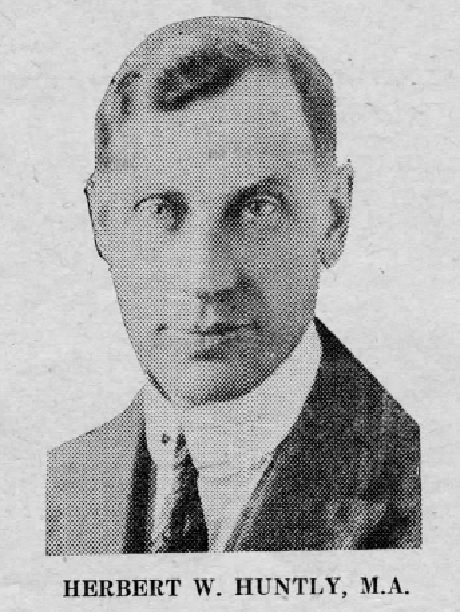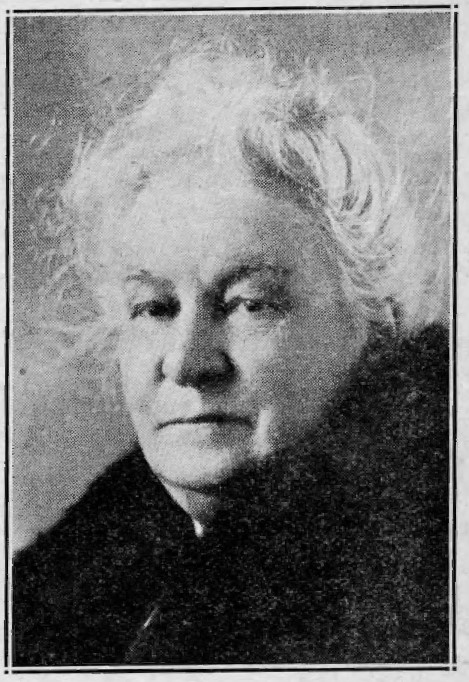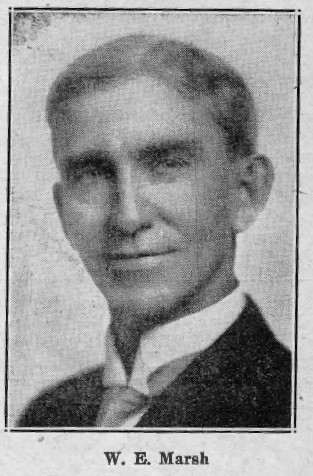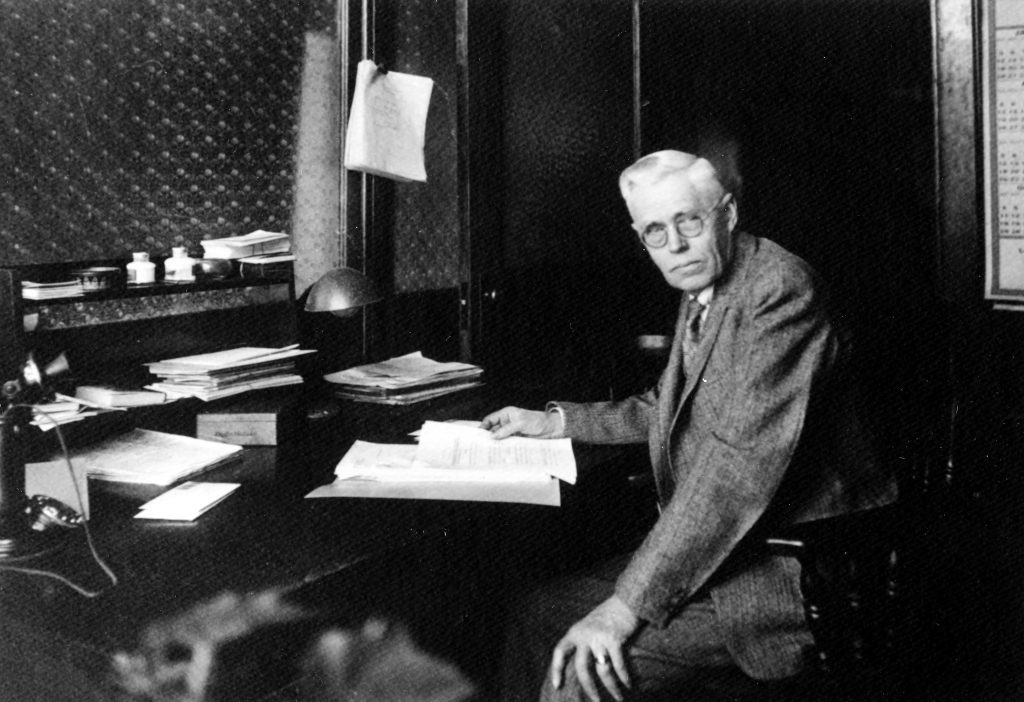The following biographical sketches of the first elected executive of the Federation are taken from the column “Who’s Who at the MTF” which ran in the Manitoba Teacher over first months of 1924.
President – Herbert W. Huntly 
Canadian by descent, parentage and ideals, is as Canadian in character as he is in appearance. Simplicity, lack of ostentation, kindliness, thoroughness and honesty are Canadian traits—these Mr. Huntly possesses to a degree typical of one whose ancestors hewed for themselves a home from the wilderness.
Tall, fair, blue-eyed, of athletic build, that seems strangely out of keeping with a somewhat scholastic stoop, Mr. Huntly suggests at once that he is the descendant of forbears who came more than three centuries ago to the shores of the “Island” and there set up their Canadian roof-tree.
He was born in the eighties in the village of Vernon, P.E.I. and received his early education in the village school. He attended Prince of Wales’ College and graduated from McGill University with the degrees of B.A. and M.A. Later he attended Harvard, where he specialized in Science and Psychology.
Mr. Huntly is well qualified for his profession, for as he has attended every type of educational institution from a Prince Edward Island village school to the greatest American University, so has he taught in every type, from the one roomed school of Peter’s Road in Prince Edward Island to one of the largest schools in Western Canada. He was principal, when only twenty-one, of his home-school in Vernon; later he held, successively the principalship of an academy in Quebec, an instructorship in Wesley College, Montreal, and the principalship of the Melita High School. Now he is in the St. John’s Technical High School, where he has been Science instructor for eleven years, and where he is also the principal of the evening school.
Mr. Huntly’s enthusiasm for science, his delight and appreciation of real effort put forth by his students, are contagious. This enthusiasm must have helped him over the arid monotony that comes to every teacher. An enthusiast in work, so is he also in play. His chief recreations are curling, golfing and hunting. Perhaps it is because Mr. Huntly can ignore the petty non-essentials of teaching that he is able to accomplish so much. He is well-known in professional circles not only in the province but throughout Canada.
He was the first president of the Manitoba Teachers’ Federation (1919-1922); he was president of the Canadian Federation for 1923; he was sent as a delegate to the World Federation of Educational Associations at San Francisco last summer, and is on the Illiteracy Commission of this body. It is doubtless because of the various positions he has held, as member or chief of big pedagogical organizations and member of School Board and Trustee Associations that he is able to view education from the trustee angle. This unique position helps him to see the absolute need of complete professional efficiency. He realizes that the public demands, and he maintains its right to demand that only the best qualified men and women be in charge of its schools. This demand Mr. Huntly believes will raise the status of the teaching profession.
Education of the highest efficiency for the Canadian schools, pedagogy raised to its inherent status, and Canadian democracy safe-guarded by Canadian ideals is what Mr. Huntly is striving for. If it be true that education is the guardian of young democracy, then must Mr. Huntly be glad that he is a young man who has a share in the direction of that education.
Vice-President – Miss Barbara Ferguson Stewart
Probably no member of our profession can see to so great an extent the fruits of her labor as can Miss Barbara Ferguson Stewart, of the Kelvin Technical High School, Winnipeg. She is able to look with pride at numerous students whom she taught twenty or thirty years ago, who are now filling with credit high places in the public life of Western Canada, while she is still helping to train
the sons and daughters of many of these.
Miss Stewart was born in Stirling, Ontario, in the year 1859. Her father was the late Alexander Stewart of Glasgow and her mother was from Stirling, Scotland. She has never visited the old land herself, but is Scottish to the core. Her early training was obtained in the Grammar School of Stirling, where she came under the influence of the late Doctor Pope, well known later to many in the West, through his connection with the Department of Education in Victoria, B.C.
She acquired her High School and Normal training in Belleville and Toronto, and in addition, qualified in commercial subjects and music. After ten years’ experience in teaching in the High School of Trenton, Ontario, Miss Stewart came to Winnipeg in 1889.
Many now teaching in Manitoba will remember with pleasure their associations with her in the old Collegiate Institute on Kate Street, when High School work in Winnipeg was in its early stages. Her versatility was apparent in a programme which included mathematics, English and music.
The many organizations connected with our work as teachers have always received her earnest support. She has considered. it a duty to accept the various offices, which the teachers, knowing her ability, have entrusted to her. She has always taken a very keen interest in the work of the M.T.F., and her contribution to the development of our organization in the early stages of its existence, her unwavering support of the principles for which we stand, and her cheerful acceptance of the burdens of office as Vice President of the Winnipeg Local Association for two years, have placed us under heavy obligations to her which we take this opportunity of acknowledging. Miss Stewart has always held high for herself the motto which her old students well remember.
“Thoroughness is the secret of success.” She is retiring in disposition but never afraid to come out in the open on any question of right. Her friendships are warm-hearted and loyal, her words are sincere, and her work is characterized by untiring effort.
Treasurer – Winfred Elmore Marsh
W. E. Marsh was born in 1872 at Garden Hill, Ontario. He was educated in Campbellford High School, Albert College at Belleville, and the University of Manitoba, and received his professional training in the Ontario Normal College at Hamilton, Ontario.
After teaching in Ontario several years he came to Sintaluta, Sask., where he was principal for four years. He taught for two years at Rosthern and then came in 1908 to Ninga, Manitoba, and has been in this province since that time, holding principalships at Miami, Roland, Belmont, and MacGregor. This last position he has held for the past four years.
As a teacher Mr. Marsh has unusual qualities of leadership among his students, and his pupils receive from him instruction and inspiration in more than the subjects usually mentioned on examination timetables.
His work is not confined to the school room, but he finds joy in taking active part in the life of the community. In Sunday School work, in the church choir, and in other public services he is ready and willing at all times to devote himself to the best interests of the district.
If he has a hobby it is leader work, and if he gets crazy over anything it is curling; but lovers of the “roarin’ game” look upon that as an indication of the highest type of mentality. Mr. Marsh is a very fine type of man, frank in his dealings, true as steel, with a generous grain of sly humor, which makes his most severe criticisms easily accepted. His honesty of purpose and totally unselfish nature are shown by, the following quotation from a recent letter, in which he discusses the early history of the M.T.F.:
“Your kind words I appreciate, but really I do not feel worthy of it all. What I did, and it was little when compared to the work of others since, was no more than anyone would do if in the same situation. I think it was Hamilton and King who suggested to me to start the ‘ball rolling.’ · “Now, I never considered myself exactly as president, but sort of chairman pro tern. A few of us, about 80 I think, made the preliminary move at the examination rooms at midsummer, 1918. I was chosen as chairman and selected my committee, including Nason, Huntly, Scott and Marshall. We met at Brandon two or three times before organization in April following. “At that meeting I declined the presidency and recommended Huntly, who was elected. That is all I have done and I feel it to be little enough. What I did, I did gladly and I would be well repaid to know it had helped on the good cause. ‘
“I am greatly gratified when I consider the valuable services of Huntly, Laidlaw, Reeve, Marshall and others, and am proud to think I had a part, though small it was, in initiating this great movement for the betterment of educational conditions in the province.”
Some day we shall have a history of the Federation written and few names will occupy a more honorable position than W. E. Marsh, of MacGregor.
Secretary – Edgar Kenney Marshall
No doubts assailed us when we came to decide upon the fit and proper person to occupy the post of honour—and danger—in this month’s Who’s Who column. Mr. Marshall’s services to the Federation will always entitle him to an honored position among the Fathers of (con)Federation, and when at the Easter Convention he was appointed to one of the very highest positions in the gift of the teachers of the Province it was obvious even to the meanest intelligence that E. K.’s turn had come. It should have fallen to the lot of a more eloquent pen than that of the writer to deal with a career so varied, so successful, and so unselfish as that of Mr. Marshall.
It was on Aug. 6th, 1876, that Mr. Marshall first saw the light on a farm near Shelburne, County Dufferin, Ontario. His ancestry is as Scottish as his name, and has its roots in that part of Scotland where industry is declining in consequence of the wide-spread prohibition movement.
His education was along lines similar to that of many of Ontario’s best sons, who have made a home for themselves in Western Canada. He attended public school at Shelburne, high school at Owen Sound Collegiate Institute, and took his normal training at Ottawa. By way of further preparation for his life’s work, Mr. Marshall underwent a very varied and full course of training. Two years at Manitoba University were followed by a course in philosophy at Illinois University, where he also took his Master’s Degree. Further courses at Chicago included special work in English, Philosophy, and History of Education.
Research work next claimed his attention under Professor Starbuck, of Leland Stanford University, California, (” Child Study”), and Dr. G. Stanley Hall, of Clark University (“Pedagogy”; ‘Psychology of Childhood”).
Mr. Marshall’s wide academic training is backed by an equally wide teaching experience gained in schools of many different types. After two years’ teaching in Ontario, Mr. Marshall, on first coming west, taught rural schools at Arbroath and Rossendale for four years. For the next four years he was principal at Sidney, and in 1905 was appointed to the Portage la Prairie staff as a public school principal. His thorough knowledge of English led to his transfer to the Portage Collegiate Institute ten years ago as head of the English Department, a position he still holds.
Mr. Marshall has a tremendous capacity for work. There seems to have been no time in his life when the thorough and successful discharge of his duties as a teacher was sufficient f o r him. Twenty years ago while at Sidney he broke into the work of “journalism as editor of “The New Era,” a paper published locally.
Since that time he has been a regular and prolific contributor to the columns of the Free Press, Tribune, Farmers’ Advocate, Grain Growers’ Guide. He has for years been western correspondent for “The School” the most widely read of Canada’s educational journals. His writings have made him one of the best known teachers in the Dominion, and are always distinguished by their literary merit and sound, clear thinking. Among the teachers of English in the Province, he occupies a unique position, and for the past three years has been Chairman of the Sub-Examiners in English.
Mr. Marshall takes a broad view of his duties as a citizen and does not consider that he should be debarred by his profession from taking an active part in the political movements of the day. He is chairman of the Portage Ratepayers’ Association, and one of the leading figures i n the Conservative party of his home town. His keen interest in the Progressive movement gives rise to much conjecture both in Portage and elsewhere. For fifteen years he has occupied the responsible position of Clerk of Kirk Session in the Portage Presbyterian Kirk.
Mr. Marshall’s fund of geniality is inexhaustible. Much of it is spent on his family, which includes two boys and two girls, in addition to Mrs. Marshall; but there is enough left over to make him a very popular member of the Canadian Club and the recently organized Portage Kiwanis. His closest friends assure us that he is utterly free from vice of any kind, but for an unfortunate tendency to go crazy over a baseball game.
Mr. Marshall’s great services to the teaching profession in Manitoba can only be touched upon briefly. He was a member of the original Federation Committee formed in July, 1918. At the organization meeting held at Easter, 1919, he was elected to the Executive and appointed Editor of the Bulletin. In this position he did splendid service for four years, and made the Federation Bulletin one of the main instruments in the development of the organization. In 1922 he succeeded Mr. Huntly as President of the M.T.F., and put in a very fine year’s work under very trying conditions. It was a year of severe financial depression with the Brandon trouble coming right in the middle of it. Mr. Marshall’s unfailing good humour, sound judgement, and inflexibility of purpose did much to determine the policy of the Federation upon this issue, and to make possible the splendid success recently achieved. In addition to the multitudinous activities entailed by his work as an officer of the Federation, Mr. Marshall has for the past five years ably represented the high school teachers of the Province upon the Advisory Board, where his wide knowledge of educational conditions and his keen interest in educational efficiency have made him a real power. He has also been one of Manitoba’s representatives at each of the last three annual meetings of the Canadian Teachers’ Federation, and has proved his worth at all of them.
We are glad to take this opportunity of expressing our appreciation of the long and distinguished service rendered to the profession as a role by Mr. Marshall, and to congratulate him heartily upon his richly deserved appointment t o the position of President of the Manitoba Educational Association.
E.K. Marshall went on to being appointed the first General Secretary and serving in that capacity for twenty years from 1925 to 1945.
